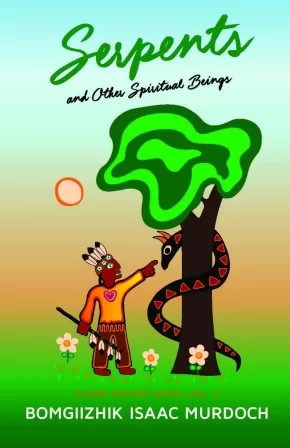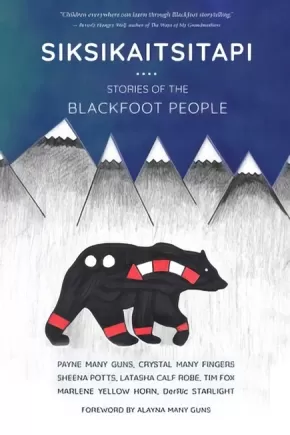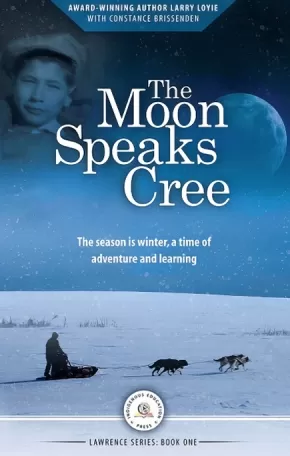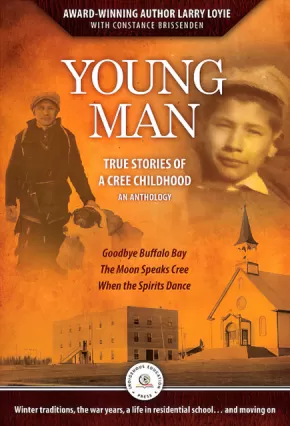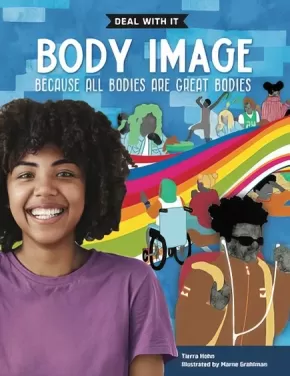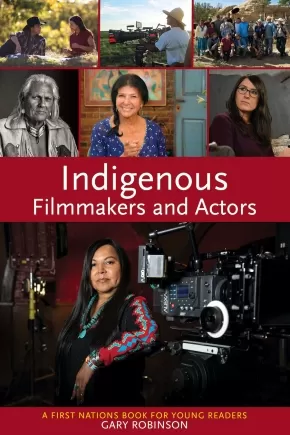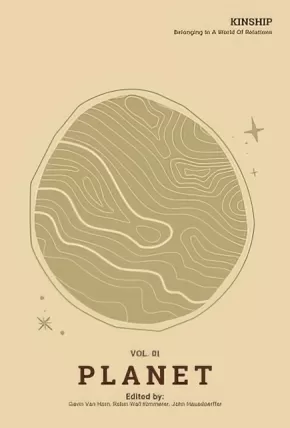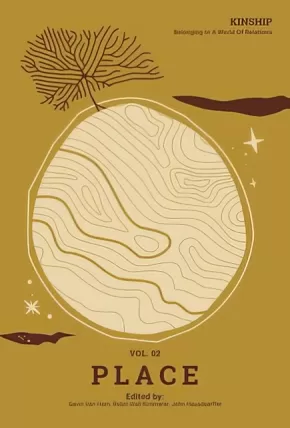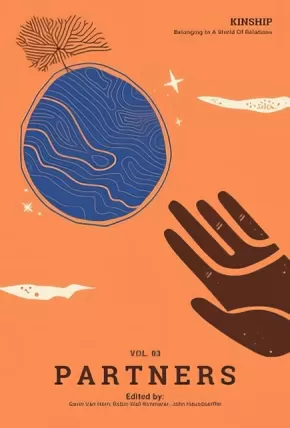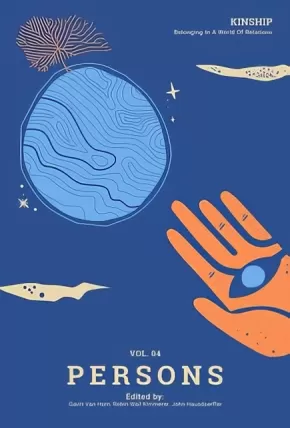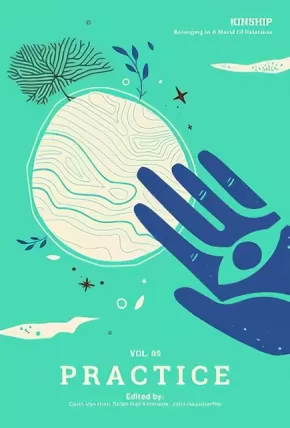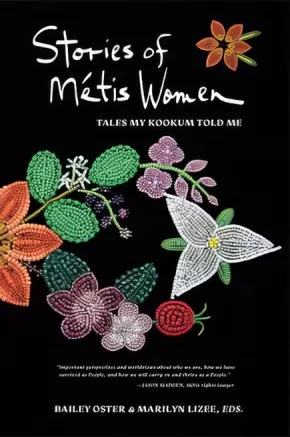
Series
16
-
30
of
74 Results;
Sort By
Go To
of 5
Serpents and Other Spiritual Beings
$25.00
Format:
Paperback
Text Content Territories:
Indigenous Canadian; First Nations; Anishinaabeg; Ojibway;
Reading Level: N/A
ISBN / Barcode: 9781928120353
Synopsis:
Synopsis:
Serpents and Other Spiritual Beings is the second book in a series by renowned Ojibwe storyteller Bomgiizhik Isaac Murdoch, following on The Trail of Nenaboozhoo and Other Creation Stories (2019). Serpents and Other Spiritual Beings is a collection of traditional Ojibwe/Anishinaabe stories transliterated directly from Murdoch's oral storytelling. Part history, legend, and mythology, these are stories of tradition, magic and transformation, morality and object lessons, involving powerful spirit-beings in serpent form. The stories appear in both English and Anishinaabemowin, with translations by Patricia BigGeorge. Murdoch's traditional-style Ojibwe artwork provides beautiful illustrations throughout.
Reviews
"'When the Thunderbirds and Serpents fight, they feed off each other, you know great medicine gets cast across the land. We get our life from that.' So writes storyteller Isaac Murdoch as he shares his Elders' stories about tunnels beneath the earth, rich laws, philosophies, teachings, power from up there, down there, and all around us, until we too hear the thunders as they bring us into the world of wahkotowin, all our relations. How privileged and blessed we are to be able to read the Ahtyokaywina of our people."--Maria Campbell, author of Halfbreed
"Gather around, for here are oral stories transcribed so they retain the flavour of a narrative spoken aloud, and translated into Anishinaabemowin; perfect for language-learners. I love the way these stories infuse the spirit world into an every-day context, these are not dusty old legends, but a living way of seeing the world around us in the here and now."--Nathan Niigan Noodin Adler, author of Ghost Lake
Educator & Series Information
Dual-Language: English and Anishinaabemowin.
Anishinaabemowin translation by Patricia BigGeorge, who is an Anishinaabemowin speaker and translator.
This book is Vol. 2 in the Ojibwe History Series.
Additional Information
100 pages | 5.50" x 8.50" | 20 illustrations | Paperback
Siksikaitsitapi: Stories of the Blackfoot People
$37.50
Text Content Territories:
Indigenous Canadian; First Nations; Blackfoot Confederacy (Siksikaitsitapi); Piikani (Peigan, Aapatohsipikani); Kainai (Blood); Siksika (Blackfoot);
ISBN / Barcode: 9781988824833
Synopsis:
Synopsis:
In Siksikaitsitapi: Stories of the Blackfoot People, seven authors share their stories that come from both from legend and from their personal experiences, with many of the stories in both Blackfoot and English languages. The book is illustrated with beautiful full-colour pictures and photos which help convey these stories from Blackfoot traditional and contemporary traditions and cultures. The Blackfoot Confederacy is made up of the Siksika, Kainai, Piikani, and Amskapi Piikuni Nations of Southern Alberta and Montana.
Payne Many Guns' story captures the ways the Blackfoot People live in harmony with the land, animals, and stars in their traditional lands.
Crystal Many Fingers tells a delightful, modern story about animals, their gifts, and why they were put on Earth.
Sheena Potts' story beautifully illustrates the many ways love is alive in Blackfoot traditions and culture.
Tim Fox tells a humerous story about mice who are having a celebration that the raven Napi and a group of dogs want to join.
Marlene Yellow Horn shares her personal story of the teachings she learned as a child about the Elders' traditional and sacred knowledge.
DerRic Starlight tells the tale of Morning Star's diverse and loving family life.
Foreword is by Alayna Many Guns.
Educator & Series Information
The publisher recommends this title for grades 6 to 12, but these stories will appeal to children of all ages.
This book is part of the Indigenous Spirit of Nature series.
"These Blackfoot children’s book chapters share common knowledge stories which have been shared to our authors. Common knowledge includes everyday lessons and norms. The book provides us with an opportunity to reclaim our truths. In the past, sitting with an Elder and listening to traditional stories of the stars, the animals, Napi, and our purpose was a great gift. Today, this is more important than ever. Elders gift us with purpose, strength, knowledge, and love." - Alayna Many Guns, from the foreword
Additional Information
144 pages | 6.00" x 9.00" | Colour illustrations | Paperback
The Moon Speaks Cree
$19.99
Format:
Paperback
Text Content Territories:
Indigenous Canadian; First Nations; Cree (Nehiyawak);
ISBN / Barcode: 9781990297281
Synopsis:
Synopsis:
The Moon Speaks Cree. The season is winter, a time of adventure and learning. Written by Award-Winning Cree author Larry Loyie with Constance Brissenden.
In this book, The Moon Speaks Cree, young Lawrence learns the secrets of winter survival from his parents and grandparents. Based on Larry Loyie’s Traditional Cree childhood, the story teaches lessons on: the effect of change on Indigenous People, respect for culture and history, and universal lessons of Cree culture.
Educator & Series Information
Recommended by publisher for grades 4 to 9.
This book is part of The Lawrence Series.
Additional Information
60 Pages | Paperback
Young Man: True Stories of a Cree Childhood: An Anthology
$14.99
Format:
Paperback
Text Content Territories:
Indigenous Canadian; First Nations; Cree (Nehiyawak);
ISBN / Barcode: 9781990297304
Synopsis:
Synopsis:
Larry Loyie, award-winning Cree author, educator, and playwright writes honestly, tenderly, with laughter as well as sadness about his traditional childhood interrupted by six years in residential school. Three books in the Lawrence Series are included in Young Man, True Stories of a Cree Childhood. This book includes 53 photographs from the author’s life.
Educator Information
Recommended for grades 4 to 9.
This anthology includes three books:
- Goodbye Buffalo Bay
- The Moon Speaks Cree
- When the Spirits Dance
Additional Information
200 Pages | Paperback
Body Image: Deal with it because all bodies are great bodies
$24.95
Artists:
Format:
Hardcover
ISBN / Barcode: 9781459414532
Synopsis:
Synopsis:
Too fat, too thin. Muffin top, flat bum, thunder thighs, spaghetti arms. From an early age, kids learn they are judged for how they look. Both boys and girls are bombarded with messages of what they should look like and are shamed for not measuring up. When kids encounter conflict based on stereotypes of body image, they need the understanding and the tools to deal with the situation and not let it damage their self-esteem. This book provides information, relatable situations and opportunities for kids to explore cultural standards, their own assumptions and those of others.
This accessible illustrated book offers information, quizzes, comics and real-life situations to help kids think critically about body image, how it influences how others see them and how they see themselves. Considered from the viewpoints of the Internalizer, who suffers from body-image issues, the Influencer, who perpetuates negative stereotypes and standards of body image and the Witness, with conflicts around body image, this issue is identified, examined and put into a context kids can use to navigate issues of shaming and self-esteem.
Educator & Series Information
Recommended for ages 9 to 14.
The Deal With It series helps adolescents cope with conflicts in everyday life and promote peaceful homes, schools, and communities.
Additional Information
32 pages | 8.50" x 11.02"
Indigenous Filmmakers and Actors
$10.95
Format:
Paperback
Text Content Territories:
Indigenous Canadian; Indigenous American;
ISBN / Barcode: 9781772601725
Synopsis:
Synopsis:
In these entertaining profiles, twelve Indigenous actors and filmmakers tell stories of the hard work and struggle that went into their careers. Overcoming prejudice and stereotypes in the film industry, fighting to make and promote films that demonstrate an honest portrayal of Indigenous life and heritage. Their stories show how there’s more to filmmaking than acting and directing, including writing, producing, editing, designing, and special effects.
Their accomplishments include acting in major blockbuster films and TV shows, directing prize-winning documentaries, running film programs, and starting a film festival to promote Indigenous voices. These twelve have stood on the shoulders of the Indigenous filmmakers who came before them, and are working to open doors for the next generation. They encourage young people to pursue their dream, and that their stories and ideas are valuable. Includes Tantoo Cardinal, Alanis Obomsawin, and Doreen Manuel.
Educator & Series Information
This book is part of the First Nations Series for Young Readers. Each book is a collection of biographies of First Nations, Métis, and Inuit women and men who are leaders in their fields of work, in their art, and in their communities.
Recommended for ages 9-14.
Subjects:
Language Arts
> Biography
Reflecting Diversity
> First Nations & Indigenous Peoples
Additional Information
128 pages | 6.00" x 9.00"
Kinship: Belonging in a World of Relations, Vol. 1 - Planet
$29.95
Editors:
Format:
Paperback
Text Content Territories:
Indigenous;
Reading Level: N/A
ISBN / Barcode: 9781736862506
Synopsis:
Additional Information
180 pages | 5.27" x 7.75" | Paperback
Synopsis:
Volume 1 of the Kinship series revolves around the question of planetary relations: What are the sources of our deepest evolutionary and planetary connections, and of our profound longing for kinship?
We live in an astounding world of relations. We share these ties that bind with our fellow humans—and we share these relations with nonhuman beings as well. From the bacterium swimming in your belly to the trees exhaling the breath you breathe, this community of life is our kin—and, for many cultures around the world, being human is based upon this extended sense of kinship.
Kinship: Belonging in a World of Relations is a lively series that explores our deep interconnections with the living world. The five Kinship volumes—Planet, Place, Partners, Persons, Practice—offer essays, interviews, poetry, and stories of solidarity, highlighting the interdependence that exists between humans and nonhuman beings. More than 70 contributors—including Robin Wall Kimmerer, Richard Powers, David Abram, J. Drew Lanham, and Sharon Blackie—invite readers into cosmologies, narratives, and everyday interactions that embrace a more-than-human world as worthy of our response and responsibility.
With every breath, every sip of water, every meal, we are reminded that our lives are inseparable from the life of the world—and the cosmos—in ways both material and spiritual. “Planet,” Volume 1 of the Kinship series, focuses on our Earthen home and the cosmos within which our “pale blue dot” of a planet nestles. National poet laureate Joy Harjo opens up the volume asking us to “Remember the sky you were born under.” The essayists and poets that follow—such as geologist Marcia Bjornerud who takes readers on a Deep Time journey, geophilosopher David Abram who imagines the Earth’s breathing through animal migrations, and theoretical physicist Marcelo Gleiser who contemplates the relations between mystery and science—offer perspectives from around the world and from various cultures about what it means to be an Earthling, and all that we share in common with our planetary kin. “Remember,” Harjo implores, “all is in motion, is growing, is you.”
Proceeds from sales of Kinship benefit the nonprofit, non-partisan Center for Humans and Nature, which partners with some of the brightest minds to explore human responsibilities to each other and the more-than-human world. The Center brings together philosophers, ecologists, artists, political scientists, anthropologists, poets and economists, among others, to think creatively about a resilient future for the whole community of life.
We live in an astounding world of relations. We share these ties that bind with our fellow humans—and we share these relations with nonhuman beings as well. From the bacterium swimming in your belly to the trees exhaling the breath you breathe, this community of life is our kin—and, for many cultures around the world, being human is based upon this extended sense of kinship.
Kinship: Belonging in a World of Relations is a lively series that explores our deep interconnections with the living world. The five Kinship volumes—Planet, Place, Partners, Persons, Practice—offer essays, interviews, poetry, and stories of solidarity, highlighting the interdependence that exists between humans and nonhuman beings. More than 70 contributors—including Robin Wall Kimmerer, Richard Powers, David Abram, J. Drew Lanham, and Sharon Blackie—invite readers into cosmologies, narratives, and everyday interactions that embrace a more-than-human world as worthy of our response and responsibility.
With every breath, every sip of water, every meal, we are reminded that our lives are inseparable from the life of the world—and the cosmos—in ways both material and spiritual. “Planet,” Volume 1 of the Kinship series, focuses on our Earthen home and the cosmos within which our “pale blue dot” of a planet nestles. National poet laureate Joy Harjo opens up the volume asking us to “Remember the sky you were born under.” The essayists and poets that follow—such as geologist Marcia Bjornerud who takes readers on a Deep Time journey, geophilosopher David Abram who imagines the Earth’s breathing through animal migrations, and theoretical physicist Marcelo Gleiser who contemplates the relations between mystery and science—offer perspectives from around the world and from various cultures about what it means to be an Earthling, and all that we share in common with our planetary kin. “Remember,” Harjo implores, “all is in motion, is growing, is you.”
Proceeds from sales of Kinship benefit the nonprofit, non-partisan Center for Humans and Nature, which partners with some of the brightest minds to explore human responsibilities to each other and the more-than-human world. The Center brings together philosophers, ecologists, artists, political scientists, anthropologists, poets and economists, among others, to think creatively about a resilient future for the whole community of life.
Educator & Series Information
Contributors are both Indigenous and non-Indigenous.
Contributors are both Indigenous and non-Indigenous.
Kinship: Belonging in a World of Relations is a lively series that explores our deep interconnections with the living world. The five Kinship volumes—Planet, Place, Partners, Persons, Practice—offer essays, interviews, poetry, and stories of solidarity, highlighting the interdependence that exists between humans and nonhuman beings. More than 70 contributors—including Robin Wall Kimmerer, Richard Powers, David Abram, J. Drew Lanham, and Sharon Blackie—invite readers into cosmologies, narratives, and everyday interactions that embrace a more-than-human world as worthy of our response and responsibility.
Additional Information
180 pages | 5.27" x 7.75" | Paperback
Kinship: Belonging in a World of Relations, Vol. 2 - Place
$29.95
Editors:
Format:
Paperback
Text Content Territories:
Indigenous;
Reading Level: N/A
ISBN / Barcode: 9781736862513
Synopsis:
Additional Information
204 pages | 5.27" x 7.75" | Paperback
Synopsis:
Volume 2 of the Kinship series revolves around the question of place-based relations: To what extent does crafting a deeper connection with the Earth’s bioregions reinvigorate a sense of kinship with the place-based beings, systems, and communities that mutually shape one another?
We live in an astounding world of relations. We share these ties that bind with our fellow humans—and we share these relations with nonhuman beings as well. From the bacterium swimming in your belly to the trees exhaling the breath you breathe, this community of life is our kin—and, for many cultures around the world, being human is based upon this extended sense of kinship.
Kinship: Belonging in a World of Relations is a lively series that explores our deep interconnections with the living world. The five Kinship volumes—Planet, Place, Partners, Persons, Practice—offer essays, interviews, poetry, and stories of solidarity, highlighting the interdependence that exists between humans and nonhuman beings. More than 70 contributors—including Robin Wall Kimmerer, Richard Powers, David Abram, J. Drew Lanham, and Sharon Blackie—invite readers into cosmologies, narratives, and everyday interactions that embrace a more-than-human world as worthy of our response and responsibility.
Given the place-based circumstances of human evolution and culture, global consciousness may be too broad a scale of care. “Place,” Volume 2 of the Kinship series, addresses the bioregional, multispecies communities and landscapes within which we dwell. The essayists and poets in this volume take us around the world to a variety of distinctive places—from ethnobiologist Gary Paul Nabhan’s beloved and beleaguered sacred U.S.-Mexico borderlands, to Pacific islander and poet Craig Santos Perez’s ancestral shores, to writer Lisa María Madera’s “vibrant flow of kinship” in the equatorial Andes expressed in Pacha Mama’s constitutional rights in Ecuador. As Chippewa scholar-activist Melissa Nelson observes about kinning with place in her conversation with John Hausdoerffer: “Whether a desert mesa, a forested mountain, a windswept plain, or a crowded city—those places also participate in this serious play with raven cries, northern winds, car traffic, or coyote howls.” This volume reveals the ways in which playing in, tending to, and caring for place wraps us into a world of kinship.
Proceeds from sales of Kinship benefit the nonprofit, non-partisan Center for Humans and Nature, which partners with some of the brightest minds to explore human responsibilities to each other and the more-than-human world. The Center brings together philosophers, ecologists, artists, political scientists, anthropologists, poets and economists, among others, to think creatively about a resilient future for the whole community of life.
We live in an astounding world of relations. We share these ties that bind with our fellow humans—and we share these relations with nonhuman beings as well. From the bacterium swimming in your belly to the trees exhaling the breath you breathe, this community of life is our kin—and, for many cultures around the world, being human is based upon this extended sense of kinship.
Kinship: Belonging in a World of Relations is a lively series that explores our deep interconnections with the living world. The five Kinship volumes—Planet, Place, Partners, Persons, Practice—offer essays, interviews, poetry, and stories of solidarity, highlighting the interdependence that exists between humans and nonhuman beings. More than 70 contributors—including Robin Wall Kimmerer, Richard Powers, David Abram, J. Drew Lanham, and Sharon Blackie—invite readers into cosmologies, narratives, and everyday interactions that embrace a more-than-human world as worthy of our response and responsibility.
Given the place-based circumstances of human evolution and culture, global consciousness may be too broad a scale of care. “Place,” Volume 2 of the Kinship series, addresses the bioregional, multispecies communities and landscapes within which we dwell. The essayists and poets in this volume take us around the world to a variety of distinctive places—from ethnobiologist Gary Paul Nabhan’s beloved and beleaguered sacred U.S.-Mexico borderlands, to Pacific islander and poet Craig Santos Perez’s ancestral shores, to writer Lisa María Madera’s “vibrant flow of kinship” in the equatorial Andes expressed in Pacha Mama’s constitutional rights in Ecuador. As Chippewa scholar-activist Melissa Nelson observes about kinning with place in her conversation with John Hausdoerffer: “Whether a desert mesa, a forested mountain, a windswept plain, or a crowded city—those places also participate in this serious play with raven cries, northern winds, car traffic, or coyote howls.” This volume reveals the ways in which playing in, tending to, and caring for place wraps us into a world of kinship.
Proceeds from sales of Kinship benefit the nonprofit, non-partisan Center for Humans and Nature, which partners with some of the brightest minds to explore human responsibilities to each other and the more-than-human world. The Center brings together philosophers, ecologists, artists, political scientists, anthropologists, poets and economists, among others, to think creatively about a resilient future for the whole community of life.
Educator & Series Information
Contributors are both Indigenous and non-Indigenous.
Contributors are both Indigenous and non-Indigenous.
Kinship: Belonging in a World of Relations is a lively series that explores our deep interconnections with the living world. The five Kinship volumes—Planet, Place, Partners, Persons, Practice—offer essays, interviews, poetry, and stories of solidarity, highlighting the interdependence that exists between humans and nonhuman beings. More than 70 contributors—including Robin Wall Kimmerer, Richard Powers, David Abram, J. Drew Lanham, and Sharon Blackie—invite readers into cosmologies, narratives, and everyday interactions that embrace a more-than-human world as worthy of our response and responsibility.
Additional Information
204 pages | 5.27" x 7.75" | Paperback
Kinship: Belonging in a World of Relations, Vol. 3 - Partners
$29.95
Editors:
Format:
Paperback
Text Content Territories:
Indigenous;
Reading Level: N/A
ISBN / Barcode: 9781736862520
Synopsis:
Additional Information
170 pages | 5.27" x 7.75" | Paperback
Synopsis:
Volume 3 of the Kinship series revolves around the question of interspecies relations: How do relations between and among different species foster a sense of responsibility and belonging in us?
We live in an astounding world of relations. We share these ties that bind with our fellow humans—and we share these relations with nonhuman beings as well. From the bacterium swimming in your belly to the trees exhaling the breath you breathe, this community of life is our kin—and, for many cultures around the world, being human is based upon this extended sense of kinship.
Kinship: Belonging in a World of Relations is a lively series that explores our deep interconnections with the living world. The five Kinship volumes—Planet, Place, Partners, Persons, Practice—offer essays, interviews, poetry, and stories of solidarity, highlighting the interdependence that exists between humans and nonhuman beings. More than 70 contributors—including Robin Wall Kimmerer, Richard Powers, David Abram, J. Drew Lanham, and Sharon Blackie—invite readers into cosmologies, narratives, and everyday interactions that embrace a more-than-human world as worthy of our response and responsibility.
How do cultural traditions, narratives, and mythologies shape the ways we relate, or not, to other beings as kin? “Partners,” Volume 3 of the Kinship series, looks to the intimate relationships of respect and reverence we share with nonhuman species. The essayists and poets in this volume explore the stunning diversity of our relations to nonhuman persons—from biologist Merlin Sheldrake’s reflections on microscopic fungal networks, to writer Julian Hoffman’s moving stories about elephant emotions and communication, to Indigenous seed activist Rowen White’s deep care for plant relatives and ancestors. Our relationships to other creatures are not merely important; they make us possible. As poet Brenda Cárdenas, inspired by her cultural connections to the monarch butterfly, notes in this volume: “We are— / one life passing through the prism / of all others, gathering color and song.”
Proceeds from sales of Kinship benefit the nonprofit, non-partisan Center for Humans and Nature, which partners with some of the brightest minds to explore human responsibilities to each other and the more-than-human world. The Center brings together philosophers, ecologists, artists, political scientists, anthropologists, poets and economists, among others, to think creatively about a resilient future for the whole community of life.
We live in an astounding world of relations. We share these ties that bind with our fellow humans—and we share these relations with nonhuman beings as well. From the bacterium swimming in your belly to the trees exhaling the breath you breathe, this community of life is our kin—and, for many cultures around the world, being human is based upon this extended sense of kinship.
Kinship: Belonging in a World of Relations is a lively series that explores our deep interconnections with the living world. The five Kinship volumes—Planet, Place, Partners, Persons, Practice—offer essays, interviews, poetry, and stories of solidarity, highlighting the interdependence that exists between humans and nonhuman beings. More than 70 contributors—including Robin Wall Kimmerer, Richard Powers, David Abram, J. Drew Lanham, and Sharon Blackie—invite readers into cosmologies, narratives, and everyday interactions that embrace a more-than-human world as worthy of our response and responsibility.
How do cultural traditions, narratives, and mythologies shape the ways we relate, or not, to other beings as kin? “Partners,” Volume 3 of the Kinship series, looks to the intimate relationships of respect and reverence we share with nonhuman species. The essayists and poets in this volume explore the stunning diversity of our relations to nonhuman persons—from biologist Merlin Sheldrake’s reflections on microscopic fungal networks, to writer Julian Hoffman’s moving stories about elephant emotions and communication, to Indigenous seed activist Rowen White’s deep care for plant relatives and ancestors. Our relationships to other creatures are not merely important; they make us possible. As poet Brenda Cárdenas, inspired by her cultural connections to the monarch butterfly, notes in this volume: “We are— / one life passing through the prism / of all others, gathering color and song.”
Proceeds from sales of Kinship benefit the nonprofit, non-partisan Center for Humans and Nature, which partners with some of the brightest minds to explore human responsibilities to each other and the more-than-human world. The Center brings together philosophers, ecologists, artists, political scientists, anthropologists, poets and economists, among others, to think creatively about a resilient future for the whole community of life.
Educator & Series Information
Contributors are both Indigenous and non-Indigenous.
Contributors are both Indigenous and non-Indigenous.
Kinship: Belonging in a World of Relations is a lively series that explores our deep interconnections with the living world. The five Kinship volumes—Planet, Place, Partners, Persons, Practice—offer essays, interviews, poetry, and stories of solidarity, highlighting the interdependence that exists between humans and nonhuman beings. More than 70 contributors—including Robin Wall Kimmerer, Richard Powers, David Abram, J. Drew Lanham, and Sharon Blackie—invite readers into cosmologies, narratives, and everyday interactions that embrace a more-than-human world as worthy of our response and responsibility.
Additional Information
170 pages | 5.27" x 7.75" | Paperback
Kinship: Belonging in a World of Relations, Vol. 4 - Persons
$29.95
Editors:
Format:
Paperback
Text Content Territories:
Indigenous;
Reading Level: N/A
ISBN / Barcode: 9781736862537
Synopsis:
Additional Information
194 pages | 5.27" x 7.75" | Paperback
Synopsis:
Volume 4 of the Kinship series revolves around the question of interpersonal relations: Which experiences expand our understanding of being human in relation to other-than-human beings?
We live in an astounding world of relations. We share these ties that bind with our fellow humans—and we share these relations with nonhuman beings as well. From the bacterium swimming in your belly to the trees exhaling the breath you breathe, this community of life is our kin—and, for many cultures around the world, being human is based upon this extended sense of kinship.
Kinship: Belonging in a World of Relations is a lively series that explores our deep interconnections with the living world. The five Kinship volumes—Planet, Place, Partners, Persons, Practice—offer essays, interviews, poetry, and stories of solidarity, highlighting the interdependence that exists between humans and nonhuman beings. More than 70 contributors—including Robin Wall Kimmerer, Richard Powers, David Abram, J. Drew Lanham, and Sharon Blackie—invite readers into cosmologies, narratives, and everyday interactions that embrace a more-than-human world as worthy of our response and responsibility.
Kinship spans the cosmos, but it is perhaps most life-changing when experienced directly and personally. “Persons,” Volume 4 of the Kinship series, attends to the personal—our unique experiences with particular creatures and landscapes. This includes nonhuman kin that become our allies, familiars, and teachers as we navigate a “world as full of persons, human and otherwise, all more-or-less close kin, all deserving respect,” as religious studies scholar Graham Harvey puts it. The essayists and poets in the volume share a wide variety of kinship-based experiences—from Australian ecophilosopher Freya Mathews’s perspective on climate-related devastation on her country’s koalas, to English professor and forest therapy guide Kimberly Ruffin’s reclamation of her “inner animal,” to German biologist and philosopher Andreas Weber’s absorption with and by lichen. Our kinships are interpersonal, and being “pried open with curiosity,” as poet and hip-hop emcee Manon Voice notes in this volume, “Stir the first of many magicks.”
Proceeds from sales of Kinship benefit the nonprofit, non-partisan Center for Humans and Nature, which partners with some of the brightest minds to explore human responsibilities to each other and the more-than-human world. The Center brings together philosophers, ecologists, artists, political scientists, anthropologists, poets and economists, among others, to think creatively about a resilient future for the whole community of life.
We live in an astounding world of relations. We share these ties that bind with our fellow humans—and we share these relations with nonhuman beings as well. From the bacterium swimming in your belly to the trees exhaling the breath you breathe, this community of life is our kin—and, for many cultures around the world, being human is based upon this extended sense of kinship.
Kinship: Belonging in a World of Relations is a lively series that explores our deep interconnections with the living world. The five Kinship volumes—Planet, Place, Partners, Persons, Practice—offer essays, interviews, poetry, and stories of solidarity, highlighting the interdependence that exists between humans and nonhuman beings. More than 70 contributors—including Robin Wall Kimmerer, Richard Powers, David Abram, J. Drew Lanham, and Sharon Blackie—invite readers into cosmologies, narratives, and everyday interactions that embrace a more-than-human world as worthy of our response and responsibility.
Kinship spans the cosmos, but it is perhaps most life-changing when experienced directly and personally. “Persons,” Volume 4 of the Kinship series, attends to the personal—our unique experiences with particular creatures and landscapes. This includes nonhuman kin that become our allies, familiars, and teachers as we navigate a “world as full of persons, human and otherwise, all more-or-less close kin, all deserving respect,” as religious studies scholar Graham Harvey puts it. The essayists and poets in the volume share a wide variety of kinship-based experiences—from Australian ecophilosopher Freya Mathews’s perspective on climate-related devastation on her country’s koalas, to English professor and forest therapy guide Kimberly Ruffin’s reclamation of her “inner animal,” to German biologist and philosopher Andreas Weber’s absorption with and by lichen. Our kinships are interpersonal, and being “pried open with curiosity,” as poet and hip-hop emcee Manon Voice notes in this volume, “Stir the first of many magicks.”
Proceeds from sales of Kinship benefit the nonprofit, non-partisan Center for Humans and Nature, which partners with some of the brightest minds to explore human responsibilities to each other and the more-than-human world. The Center brings together philosophers, ecologists, artists, political scientists, anthropologists, poets and economists, among others, to think creatively about a resilient future for the whole community of life.
Educator & Series Information
One of the editors of this work is Indigenous. And, throughout the series, various Indigenous contributions (stories, poems, etc.) can be found.
One of the editors of this work is Indigenous. And, throughout the series, various Indigenous contributions (stories, poems, etc.) can be found.
Kinship: Belonging in a World of Relations is a lively series that explores our deep interconnections with the living world. The five Kinship volumes—Planet, Place, Partners, Persons, Practice—offer essays, interviews, poetry, and stories of solidarity, highlighting the interdependence that exists between humans and nonhuman beings. More than 70 contributors—including Robin Wall Kimmerer, Richard Powers, David Abram, J. Drew Lanham, and Sharon Blackie—invite readers into cosmologies, narratives, and everyday interactions that embrace a more-than-human world as worthy of our response and responsibility.
Additional Information
194 pages | 5.27" x 7.75" | Paperback
Kinship: Belonging in a World of Relations, Vol. 5 - Practice
$29.95
Editors:
Format:
Paperback
Text Content Territories:
Indigenous;
Reading Level: N/A
ISBN / Barcode: 9781736862544
Synopsis:
Additional Information
194 pages | 5.27" x 7.75" | Paperback
Synopsis:
Volume 5 of the Kinship series revolves around the question of practice: What are the practical, everyday, and lifelong ways we become kin?
We live in an astounding world of relations. We share these ties that bind with our fellow humans—and we share these relations with nonhuman beings as well. From the bacterium swimming in your belly to the trees exhaling the breath you breathe, this community of life is our kin—and, for many cultures around the world, being human is based upon this extended sense of kinship.
Kinship: Belonging in a World of Relations is a lively series that explores our deep interconnections with the living world. These five Kinship volumes—Planet, Place, Partners, Persons, Practice—offer essays, interviews, poetry, and stories of solidarity, highlighting the interdependence that exists between humans and nonhuman beings. More than 70 contributors—including Robin Wall Kimmerer, Richard Powers, David Abram, J. Drew Lanham, and Sharon Blackie—invite readers into cosmologies, narratives, and everyday interactions that embrace a more-than-human world as worthy of our response and responsibility. These diverse voices render a wide range of possibilities for becoming better kin.
From the perspective of kinship as a recognition of nonhuman personhood, of kincentric ethics, and of kinship as a verb involving active and ongoing participation, how are we to live? “Practice,” Volume 5 of the Kinship series, turns to the relations that we nurture and cultivate as part of our lived ethics. The essayists and poets in this volume explore how we make kin and strengthen kin relationships through respectful participation—from creative writer and dance teacher Maya Ward’s weave of landscape, story, song, and body, to Lakota peace activist Tiokasin Ghosthorse’s reflections on language as a key way of knowing and practicing kinship, to cultural geographer Amba Sepie’s wrestling with how to become kin when ancestral connections have frayed. The volume concludes with an amazing and spirited conversation between John Hausdoerffer, Robin Wall Kimmerer, Sharon Blackie, Enrique Salmon, Orrin Williams, and Maria Isabel Morales on the breadth and qualities of kinship practices.
Proceeds from sales of Kinship benefit the nonprofit, non-partisan Center for Humans and Nature, which partners with some of the brightest minds to explore human responsibilities to each other and the more-than-human world. The Center brings together philosophers, ecologists, artists, political scientists, anthropologists, poets and economists, among others, to think creatively about a resilient future for the whole community of life.
We live in an astounding world of relations. We share these ties that bind with our fellow humans—and we share these relations with nonhuman beings as well. From the bacterium swimming in your belly to the trees exhaling the breath you breathe, this community of life is our kin—and, for many cultures around the world, being human is based upon this extended sense of kinship.
Kinship: Belonging in a World of Relations is a lively series that explores our deep interconnections with the living world. These five Kinship volumes—Planet, Place, Partners, Persons, Practice—offer essays, interviews, poetry, and stories of solidarity, highlighting the interdependence that exists between humans and nonhuman beings. More than 70 contributors—including Robin Wall Kimmerer, Richard Powers, David Abram, J. Drew Lanham, and Sharon Blackie—invite readers into cosmologies, narratives, and everyday interactions that embrace a more-than-human world as worthy of our response and responsibility. These diverse voices render a wide range of possibilities for becoming better kin.
From the perspective of kinship as a recognition of nonhuman personhood, of kincentric ethics, and of kinship as a verb involving active and ongoing participation, how are we to live? “Practice,” Volume 5 of the Kinship series, turns to the relations that we nurture and cultivate as part of our lived ethics. The essayists and poets in this volume explore how we make kin and strengthen kin relationships through respectful participation—from creative writer and dance teacher Maya Ward’s weave of landscape, story, song, and body, to Lakota peace activist Tiokasin Ghosthorse’s reflections on language as a key way of knowing and practicing kinship, to cultural geographer Amba Sepie’s wrestling with how to become kin when ancestral connections have frayed. The volume concludes with an amazing and spirited conversation between John Hausdoerffer, Robin Wall Kimmerer, Sharon Blackie, Enrique Salmon, Orrin Williams, and Maria Isabel Morales on the breadth and qualities of kinship practices.
Proceeds from sales of Kinship benefit the nonprofit, non-partisan Center for Humans and Nature, which partners with some of the brightest minds to explore human responsibilities to each other and the more-than-human world. The Center brings together philosophers, ecologists, artists, political scientists, anthropologists, poets and economists, among others, to think creatively about a resilient future for the whole community of life.
Educator & Series Information
Contributors are both Indigenous and non-Indigenous.
Contributors are both Indigenous and non-Indigenous.
Kinship: Belonging in a World of Relations is a lively series that explores our deep interconnections with the living world. The five Kinship volumes—Planet, Place, Partners, Persons, Practice—offer essays, interviews, poetry, and stories of solidarity, highlighting the interdependence that exists between humans and nonhuman beings. More than 70 contributors—including Robin Wall Kimmerer, Richard Powers, David Abram, J. Drew Lanham, and Sharon Blackie—invite readers into cosmologies, narratives, and everyday interactions that embrace a more-than-human world as worthy of our response and responsibility.
Additional Information
194 pages | 5.27" x 7.75" | Paperback
Righting Canada's Wrongs: Residential Schools: The Devastating Impact on Canada's Indigenous Peoples and the Truth and Reconciliation Commission's Findings and Calls for Action (PB) - 2nd Edition
$29.95
Format:
Paperback
Text Content Territories:
Indigenous Canadian; First Nations; Inuit; Métis;
ISBN / Barcode: 9781459416918
Synopsis:
Synopsis:
Over more than 100 years, the Canadian government took 150,000 First Nations, Métis, and Inuit children from their families and placed them in residential schools. In these schools, young people were assigned a number, forced to wear European-style clothes, forbidden to speak their native language, required to work, and often subjected to physical and psychological abuse. If they tried to leave the schools to return to their families, they were captured by the RCMP and forced back. Run by churches, the schools were paid for by the federal government. The last residential school closed in 1996.
It took decades for people to speak out in public about the devastating impact of residential schools. School Survivors eventually came together and launched court actions against the federal government and the churches. In 2008 the Canadian government apologized for the historic wrongs committed by the residential school system. The survivors’ lawsuits led to the Indian Residential Schools Settlement Agreement, the largest class-action settlement in Canadian history, and the establishment of the Truth and Reconciliation Commission. The Commission spent six years gathering testimony and discovering the facts about residential schools.
This book includes the text of the government’s apology and summarizes the Truth and Reconciliation Commission’s 94 Calls to Action, which offer the basis for a new relationship between the Canadian government, Indigenous people and non-Indigenous people.
Reviews
"If I were purchasing materials for a high school library, I would buy at least 2 copies, and I would urge Social Studies and Aboriginal Studies classroom teachers to have at least one copy on their bookselves. Perhaps the strongest work to date in the Righting Canada's Wrongs series, Residential Schools underscores the importance of the Truth and Reconciliation Commission's work... Highly Recommended." — CM: Canadian Review of Materials
Educator & Series Information
This book is part of the Righting Canada's Wrongs series.
Recommended for ages 13 to 18.
This book is available in French: Les pensionnats indiens: Effets dévastateurs sur les peuples autochtones du Canada et appels à l'action de la Commission de vérité et réconciliation.
Additional Information
128 pages | 8.50" x 11.53" | Paperback | 2nd, Updated Edition
Righting Canada's Wrongs: The LGBT Purge and the Fight for Equal Rights in Canada
$34.95
Format:
Hardcover
ISBN / Barcode: 9781459416192
Synopsis:
Synopsis:
From the 1950s to 1980s, the Canadian government persecuted LGBTQ+ employees and tried to erase them from the military, the RCMP and the civil service under the guise that they were a “security risk,” an event that became known as the LGBT Purge. Those who were suspected of being homosexual were put under government surveillance, interrogated and intimidated. They were fired from their jobs. Many quit to avoid being exposed. Some committed suicide as a result. In the 1980s, victims of the Purge fought back with a class-action suit against the government that helped shed light on the systemic discrimination that members of the LGBTQ+ community faced from the government and the rest of society. In 2017, the federal government issued a formal apology on behalf of the government and Canadian society for the treatment of members of the LGBTQ+ community.
In this highly visual book, author Ken Setterington presents the struggle for LGBTQ+ rights using photographs, first-person accounts and excerpts from archival documents. Significant events in the struggle include the establishment of Pride parades, the Bathhouse Raids, the decriminalization of homosexuality, the passing of the Canadian Charter of Rights and Freedoms, the LGBT Purge and the legalization of same-sex marriage.
While the government’s formal acknowledgement of past injustices started Canada on a better path toward equality, there is still work to be done. This book would be a welcome addition to any classroom or library’s social justice collection and will appeal to adults interested in LGBTQ+ rights in Canada.
Educator & Series Information
Recommended for ages 13 to 18.
The Righting Canada's Wrongs series is devoted to the exploration of the mostly unknown, and often shocking, stories of Canadian government's racist actions against various ethnic groups through our history, the fight for acknowledgment and justice, and the eventual apologies and restitution of subsequent governments.
Additional Information
96 pages | 9.01" x 11.02" | 300 photographs | Hardcover
Stories of Metis Women: Tales My Kookum Told Me
$35.00
Editors:
Format:
Paperback
Text Content Territories:
Indigenous Canadian; Métis;
Reading Level: N/A
ISBN / Barcode: 9781988824215
Synopsis:
Synopsis:
This book, and accompanying Vimeo documentary link, is a collection of stories about culture, history, and nationhood as told by Métis women. The Métis are known by many names — Otipemisiwak, “the people who own ourselves;” Bois Brules, “Burnt Wood;” Apeetogosan, “half brother” by the Cree; “half-breed,” historically; and are also known as “rebels” and “traitors to Canada.” They are also known as the “Forgotten People.” Few really know their story.
Many people may also think that Métis simply means “mixed,” but it does not. They are a people with a unique and proud history and Nation. In this era of reconciliation, Stories of Métis Women explains the story of the Métis Nation from their own perspective. The UN has declared this “The Decade of Indigenous Languages” and Stories of Métis Women is one of the few books available in English and Michif, which is an endangered language.
Reviews
"With this book, some of these important and unique perspectives and worldviews about who we are as a people, how we have survived as people and how we will carry on and thrive as a people are shared through the writings of the daughters, mothers, aunties and grandmothers of the Métis Nation. I congratulate the Métis women who have taken the time to share and write down some of this knowledge for generations to come." —Jason Madden, Métis rights lawyer and citizen of the Métis Nation
Additional Information
240 pages | 6.00" x 9.00" | 50 black and white illustrations | Paperback
White Privilege: Deal With It In All Fairness
$24.95
Artists:
Format:
Hardcover
ISBN / Barcode: 9781459416215
Synopsis:
Synopsis:
For some kids, ways they can help eliminate racial injustice might be hard to see. After all, they are taught that people in society are all equal under the law. So why then does racial conflict still exist? And what can they as individuals do about it right now? One way is for white children to understand the unearned advantages they were born with based solely on the colour of their skin. This concept is called white privilege and this book will help children of all races understand it, see how it affects them and find ways to speak out and take real action against it.
White Privilege: Deal with it in all fairness provides scenarios, quizzes and Q&As that develop readers’ understanding of the subject using situations that are realistic and that easily relate to their everyday lives. The topic is approached from three points of view: those who are “privileged,” those who identify as “racialized” and those who want to be allies.
Educator & Series Information
Recommended for ages 9 to 14.
The Deal With It series helps adolescents cope with conflicts in everyday life and promote peaceful homes, schools, and communities.
Additional Information
32 pages | 8.50" x 11.02" | Library Binding
Sort By
Go To
of 5

